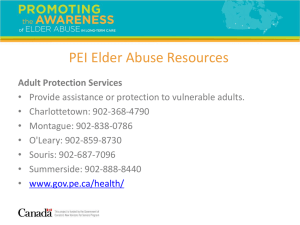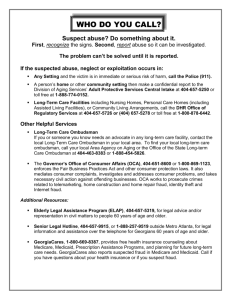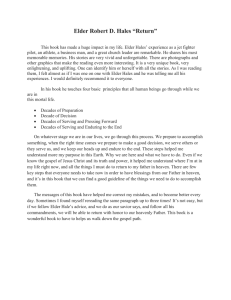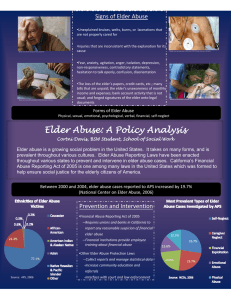Elder Financial Abuse Elder Financial Abuse Fact Sheet Who, What, Where,
advertisement
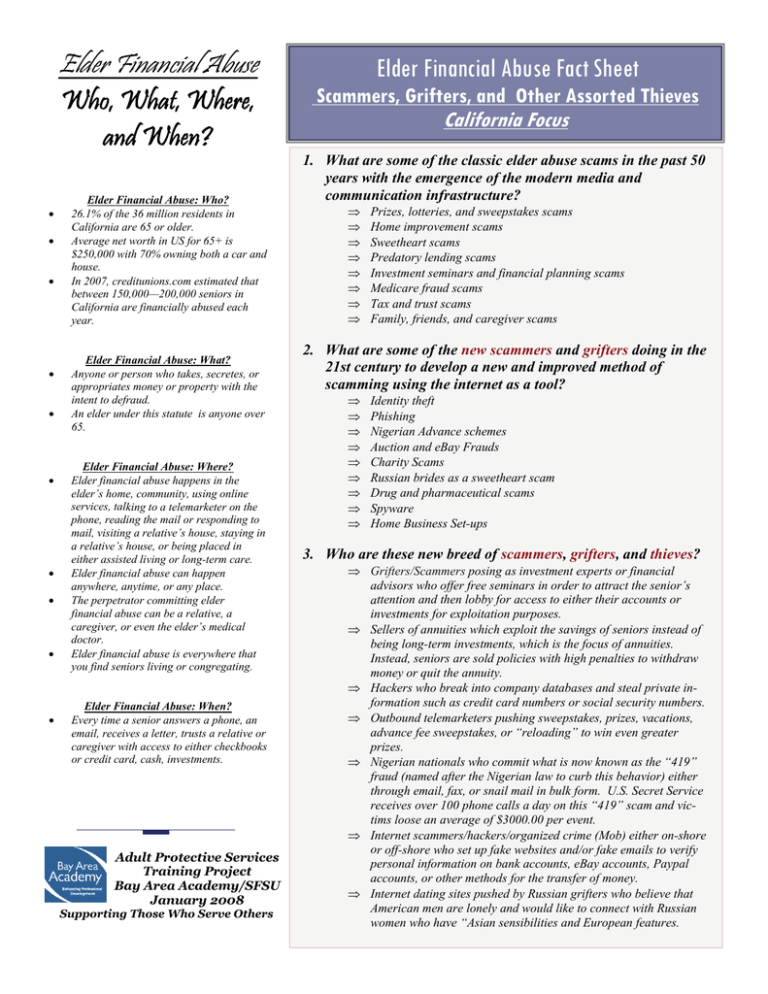
Elder Financial Abuse Who, What, Where, and When? • • • • • Elder Financial Abuse: Who? 26.1% of the 36 million residents in California are 65 or older. Average net worth in US for 65+ is $250,000 with 70% owning both a car and house. In 2007, creditunions.com estimated that between 150,000—200,000 seniors in California are financially abused each year. Assisted Living 101 Quick Fact Sheet Elder Financial Abuse: What? Anyone or person who takes, secretes, or appropriates money or property with the intent to defraud. An elder under this statute is anyone over 65. Elder Financial Abuse: Where? Elder financial abuse happens in the elder’s home, community, using online services, talking to a telemarketer on the phone, reading the mail or responding to mail, visiting a relative’s house, staying in a relative’s house, or being placed in either assisted living or long-term care. Elder financial abuse can happen anywhere, anytime, or any place. The perpetrator committing elder financial abuse can be a relative, a caregiver, or even the elder’s medical doctor. Elder financial abuse is everywhere that you find seniors living or congregating. Assisted Living : Wha t, W ho, Whe n, W here? • • • • • Elder Financial Abuse: When? Every time a senior answers a phone, an email, receives a letter, trusts a relative or caregiver with access to either checkbooks or credit card, cash, investments. Adult Protective Services Training Project Bay Area Academy/SFSU January 2008 Supporting Those Who Serve Others Elder Financial Abuse Fact Sheet Scammers, Grifters, and Other Assorted Thieves California Focus 1. What are some of the classic elder abuse scams in the past 50 years with the emergence of the modern media and communication infrastructure? ⇒ ⇒ ⇒ ⇒ ⇒ ⇒ ⇒ ⇒ Prizes, lotteries, and sweepstakes scams Home improvement scams Sweetheart scams Predatory lending scams Investment seminars and financial planning scams Medicare fraud scams Tax and trust scams Family, friends, and caregiver scams 2. What are some of the new scammers and grifters doing in the 21st century to develop a new and improved method of scamming using the internet as a tool? ⇒ ⇒ ⇒ ⇒ ⇒ ⇒ ⇒ ⇒ ⇒ Identity theft Phishing Nigerian Advance schemes Auction and eBay Frauds Charity Scams Russian brides as a sweetheart scam Drug and pharmaceutical scams Spyware Home Business Set-ups 3. Who are these new breed of scammers, grifters, and thieves? ⇒ Grifters/Scammers posing as investment experts or financial advisors who offer free seminars in order to attract the senior’s attention and then lobby for access to either their accounts or investments for exploitation purposes. ⇒ Sellers of annuities which exploit the savings of seniors instead of being long-term investments, which is the focus of annuities. Instead, seniors are sold policies with high penalties to withdraw money or quit the annuity. ⇒ Hackers who break into company databases and steal private information such as credit card numbers or social security numbers. ⇒ Outbound telemarketers pushing sweepstakes, prizes, vacations, advance fee sweepstakes, or “reloading” to win even greater prizes. ⇒ Nigerian nationals who commit what is now known as the “419” fraud (named after the Nigerian law to curb this behavior) either through email, fax, or snail mail in bulk form. U.S. Secret Service receives over 100 phone calls a day on this “419” scam and victims loose an average of $3000.00 per event. ⇒ Internet scammers/hackers/organized crime (Mob) either on-shore or off-shore who set up fake websites and/or fake emails to verify personal information on bank accounts, eBay accounts, Paypal accounts, or other methods for the transfer of money. ⇒ Internet dating sites pushed by Russian grifters who believe that American men are lonely and would like to connect with Russian women who have “Asian sensibilities and European features. Steps an Elder can take to prevent financial abuse! ⇒ Do not call registry. Lose the telemarketers by calling 888.382.1222 or going online to www.donotcall.gov—it’s free! ⇒ Screen out telemarketers. Buy an inexpensive answering machine—let your friends know that you are screening calls. ⇒ Get unlisted at Google. Find out if your information are publicly available by entering your phone number in the www.google.com search box. ⇒ Skip your mailbox for outgoing mail. Thieves love to get mail from an unlocked mailbox. ⇒ Opt out of credit card offers. Incoming credit card and insurance offers can be stopped by signing up at www.optoutprescreen.com or 888-567-8688—it’s free. ⇒ Avoid junk mail. Sign up to stop junk mail at www.dmaconsumers.org/offmailing list.html. There is a $1 charge per address. ⇒ A free credit report every 4 months. There are 3 large credit bureaus in the U.S. The law requires that they provide a consumer free credit reports once a year. Use the free official government-authorized annualcreditreport.com website or call for free 877-322-8228. Other sites charge fees, be careful. ⇒ Watch out for those lightweight credentials. Watch out! Becoming a bartender is harder than becoming a “Certified Financial Planner” www.help4srs.org/seniortruth. ⇒ Shred, shred, and shred some more! Purchase a shredder and use it. Elder Financial Abuse Fact Sheet Scammers, Grifters, and Other Assorted Thieves California Stories 1. Elder gone wild! Story of investment fraud, an elder’s reaction, and training resources developed to counter the swindlers. http://www.corp.ca.gov/pressrel/itnsaif082602sb.htm 2. Grifter impersonates nurse and robs elder man! New crime of the century with the baby boomers entering elder years. http://findarticles.com/p/articles/mi_qn4176/is_20060101/ai_n15980165 3. Relatives behaving badly, bank fraud, and check your relative’s background or this could happen to your elders! http://www.contracostatimes.com/opinion/ci_7678112?nclick_check=1 4. Predatory lender/grafter and the Lonnie Davis story...paid $17,500 for his house, used it as a personal ATM, and now his payments are $2100 a month! http://findarticles.com/p/articles/mi_qn4176/is_20071228/ai_n21180513 5. License to steal. Research article on the use of the Power of Attorney and relatives committing elder financial abuse. http://www.stjohns.edu/media/3/8975642417e64df288d548955d2dcc73.pdf 6. Let me call you sweetheart…I love your money! Shameless grifters fooling seniors at their most vulnerable time! http://www.geocities.com/S_O_S_elderabuse/index.html http://www.sfgate.com/cgibin/article.cgi?f=/chronicle/archive/2004/03/07/CMG5R5CUPE3.DTL http://www.scrippsnews.com/node/27432 7. We bet on your life and we want you to die for our profit! Fresh fun in the insurance industry with elder’s money! http://www.sfweekly.com/2007-11-28/news/roll-of-the-die-human-lifespeculators-bet-on-elder-deaths/2 8. Estate planning at its best. You may not live after you purchase an annuity from these playful Living Mill Trust insurance agents! http://communitydispatch.com/Credit_Cards___Credit_Reports___Credit_Rati ngs_87/California_Settles_Annuity_Sales_Scam.shtml 9. More scammers and grifters using the internet to phish for seniors, impersonate seniors with ID theft, and more of these fun, frolicking fraudsters. http://www.calbankers.com/content/consumer_alerts.asp 10. Who says that best friends have your back? Elder trusts best friend and loses house worth $700,000. More scams and schemes by a greedy grifter! http://www.npr.org/templates/story/story.php?storyId=4667720 Summary of the Issues with Elder Abuse Case Law in US¹ ⇒ There is a real lack of elder abuse law because most of the cases are never brought before the judicial system. ⇒ Elders, themselves, particularly the current oldest of the old are very reluctant to bring matters before the judicial system. As a result, there is a lack of knowledge in the judicial system in the case law. ⇒ There is an issue of “difficulty of proof” in elder abuse case law. • • • Lack of physical evidence due to the slowness of the courts. Witness unavailability as well as capacity to testify. Many of the financial/sexual abuse cases raise the complex issue of undue influence which can be hard to prove ⇒ Issue of financial viability for the victim and the lawyer. • • • Lack of money on the part of the victim to pay a lawyer or the loss of their money through exploitation. Compensatory damages awarded could be low due to the life expectancy of the victim. Slow collection of payment due to the lack of resources of the victim. ⇒ Slow pace of legal system. Some victims die before their case ever reaches trial. ⇒ Lack of sensitivity on the part of the courts, police, attorneys, and prosecutors...just a lack of training in the interaction with the victim makes them more hesitant to bring charges. Elder Financial Abuse Fact Sheet Scammers, Grifters, and Other Assorted Thieves California Resources 1. Get your red-hot scam busting kit free provided by the State of California for your favorite senior. Fight phishing, avoid charity scams, stop those capricious contractors and more! http://www.dca.ca.gov/consumer/seniors/senior_scam.shtml 2. Help California fight Medicare fraud with handy tips to spot those thieves in the medical business. http://ag.ca.gov/bmfea/ 3. Great website that summarizes civil and criminal elder abuse codes. http://ag.ca.gov/bmfea/laws.php 4. California Bankers website which gives specifics about how banks are trained as mandated reporters, some specific tips, and a free video for all! http://www.calbankers.com/content/consumer_alerts.asp 5. Elder Financial Protection Network homepage. Lists training sessions across California, workshops in senior centers and calls for actions. This is an excellent look at the issue and what elders are accomplishing on their own to fight elder financial abuse. http://www.bewiseonline.org/index.shtml 6. ElderAngels website fights “sweetheart scams” in Sacramento. Advice, FAQ’s, scam stories, and contact information. http://www.elderangels.com/page9.html 7. More seniors organize against those investment pitching pranksters and grifters...get more information, join the battle, and have legal fun getting rid of those thieves! http://www.corp.ca.gov/outreach/saif/saif.htm 8. Want to educate others on elder financial abuse and its damage to our economy, moral fiber, and other such concerns? Download this PDF or just send the URL to anyone who doubts the seriousness of this issue. http://safestate.org/documents/EA_Financial_Abuse_of_Seniors_2.pdf Trends in Elder Abuse Case Law ⇒ New statutory remedies are being used to “make the victim whole” such as bringing lawsuits for assault and battery, breach of fiduciary duty, conversion, false imprisonment, fraud, or negligence. ⇒ More criminal prosecution is taking place for crimes such as murder, manslaughter, embezzlement, forgery, theft, and other such crimes. Even if the victim overcomes the reluctance to prosecute, some of the issues discussed in the previous column can make these prosecutions hard to prove and slow to process. ⇒ More states are enacting elder abuse statutes. Among the most well known is the California act of “Elder Abuse and Dependent Adult Civil Protection Act” whose intent is to “engage interested persons to engage attorneys to take up the cause of abused elderly persons and dependent adults”. ⇒ More training of law enforcement officers and prosecutors, many are funded by the Department of Justice. ⇒ New prosecutorial practices such as “vertical prosecution” which means that one attorney handles the case throughout its history and prosecuting the perpetrator in the event that the victim does not want to press charges or even cooperate with the authorities. ⇒ Trend of education of civil lawyers on Elder Financial Abuse Fact Sheet Scammers, Grifters, and Other Assorted Thieves National Resources 1. Great resource on the latest of “crimes of persuasion” which are modern, trendy, and practiced nationally on our elders and ourselves... should we fall victim! http://www.crimes-ofpersuasion.com/Crimes/InPerson/MajorPerson/elder_abuse.htm http://www.wmitchell.edu/lawreview/Volume28/Issue2/13_lewis.pdf 2. Great informational site from AARP. http://www.aarp.org/money/wise_consumer/?CMP=KNC-360I-GOOGLEMAW&HBX_OU=50&HBX_PK=financial_scams+ 3. The Social Security administration receives all kinds of complaints including scams done in their name. http://usgovinfo.about.com/od/consumerawareness/a/ssascams.htm 4. The BITS Fraud Protection Toolkit: Protecting the Elderly and Vulnerable from Financial Fraud and Exploitation. http://www.bitsinfo.org/downloads/Publications%20Page/bitstoolfeb06.pdf References Henderson, L. Crimes of Persuasion: Schemes, Scams, Frauds. Azilda, Ontario, Canada. Coyote Ridge Publishing, 1999. Long, E., (2008). Senior Truth: H.E.L.P. Retrieved 4, 2008 at 3 PM PST. http://help4srs.org/seniortruth/?p=44 Silver Lake Editors, (2006). Scam & Swindles: Phishing.Spoofing. Id Theft. Nigerian Advance Schemes. Investment Frauds. How to recognize and Avoid financial Rip-Offs in the Internet Age. Aberdeen, Washington. Silver Lake Press, 2006. Stiegel, L., (2000). The Changing Role of the Courts in Elder Abuse Case Laws. Retrieved January 4, 2008 at 3 PM PST. http://utahbar.org/sites/noecomm/html/the_changing_role_of_the_court.html the issues of elder abuse. ⇒ Curricula is being developed by such organization like the ABA Commission on Legal Problems of the elderly and the National Association of Women Judges to educate the judges and courts staff on these complex issues surrounding elder abuse and the Adult Protective Services Training Project Bay Area Academy/SFSU January 2008 Acknowledgements This fact sheet was researched and prepared by Julie Riley-Harrison, APS Training Project Intern with edit and design assistance from Krista Brown, APS Training Project Coordinator. The APS Training Project is a program of the Bay Area Academy/San Francisco State University. For more information about the APS Training Project, please visit www.baa-aps.org. ©January 2008. All rights reserved.
